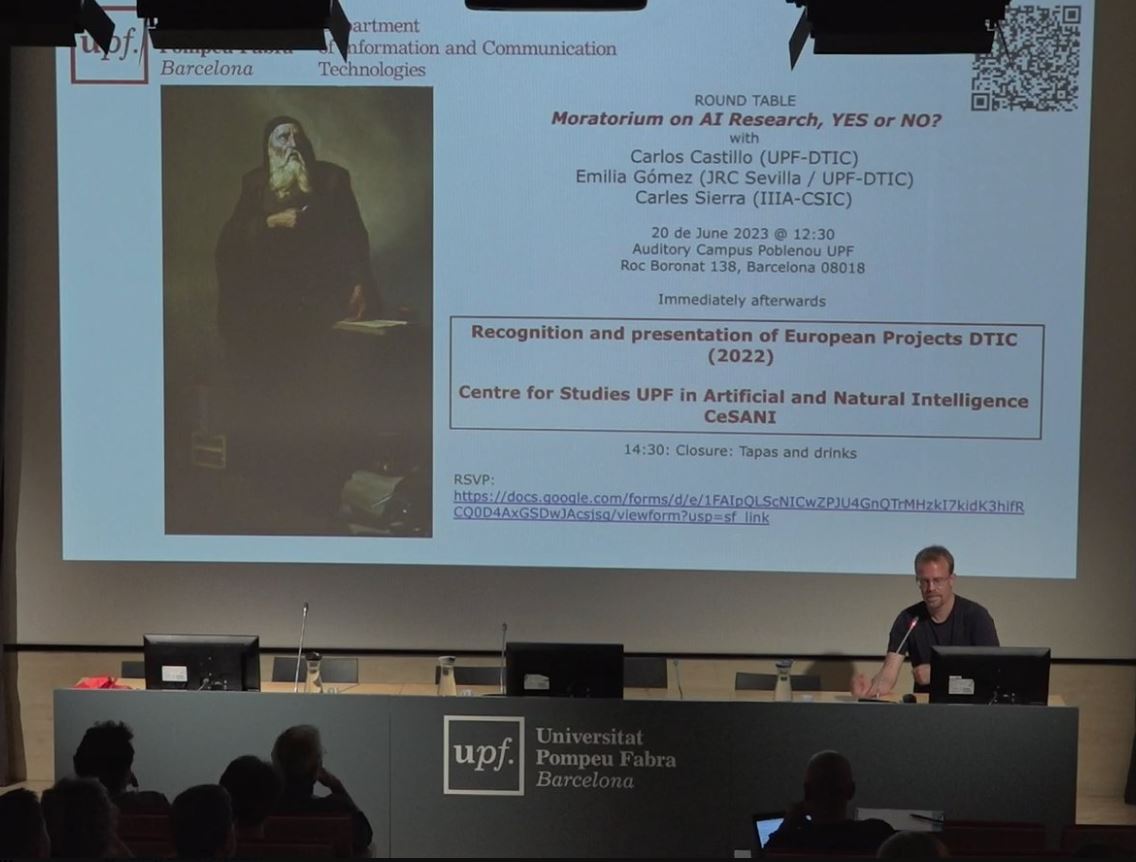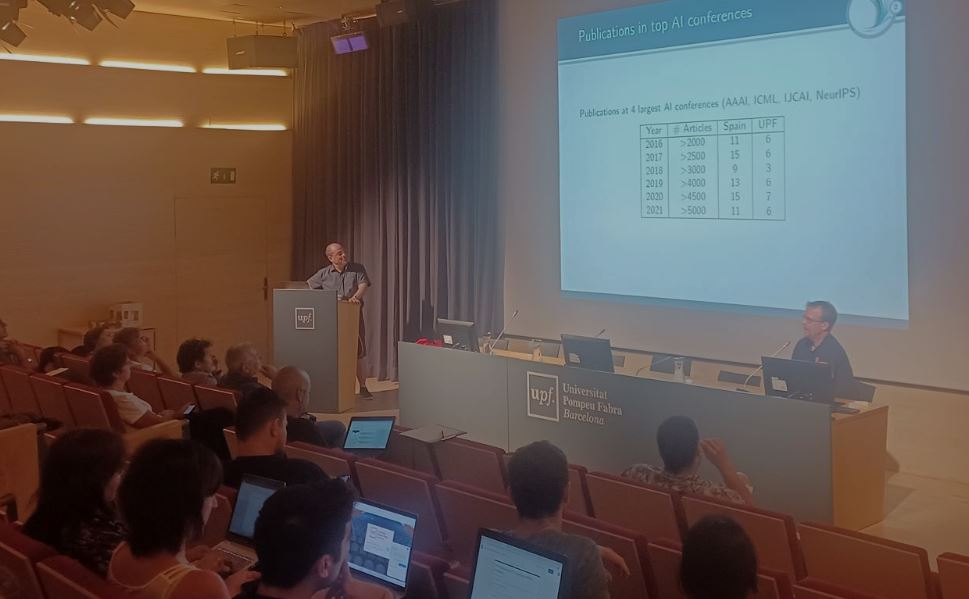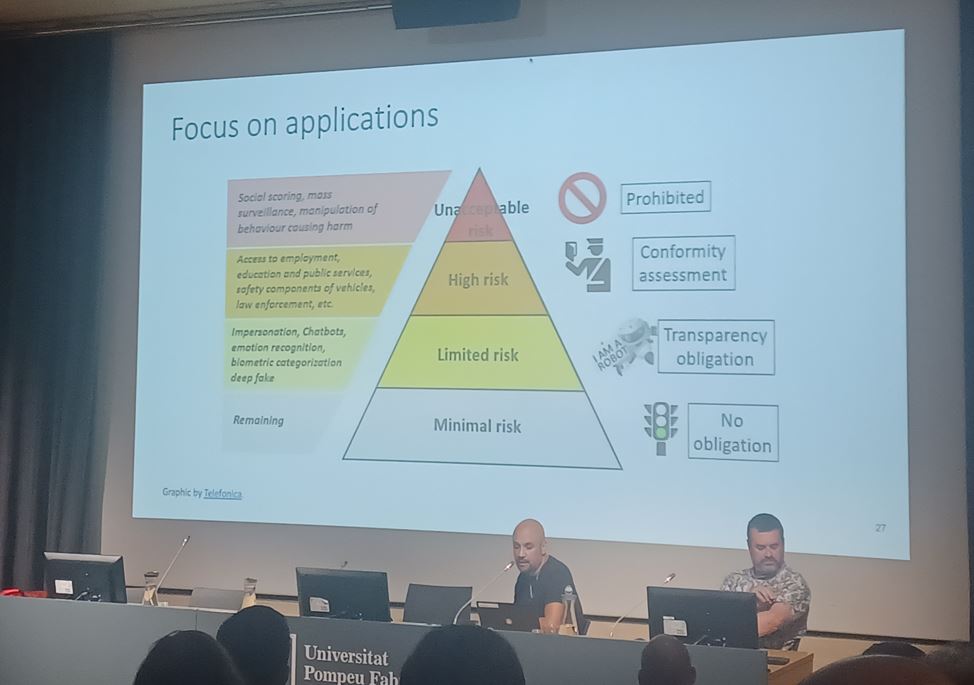UPF opens the first study centre in the Spanish state on artificial and natural intelligence, which will promote ethical criteria in this field of research
UPF opens the first study centre in the Spanish state on artificial and natural intelligence, which will promote ethical criteria in this field of research
UPF opens the first study centre in the Spanish state on artificial and natural intelligence, which will promote ethical criteria in this field of research
The Center for Studies UPF in Artificial and Natural Intelligence, which will gather 42 researchers from different disciplines, was presented yesterday coinciding with a debate on the direction that research should take in this field from now on. The experts stressed the need to weigh up the risks and opportunities of AI, regulate its uses, and promote research with criteria of social responsibility and ethics.

Yesterday, the Poblenou campus hosted the presentation of the Center for Studies UPF in Artificial and Natural Intelligence (CeSANI), with which the University seeks to promote interdisciplinary research, training and knowledge transfer to society in this field. It is a pioneering research centre in Catalonia and in Spain, which will urge research into artificial intelligence to follow ethical and sustainable criteria, in order to contribute to providing solutions to the current challenges facing humanity.
The field of studies of the CeSANI (Centre for Studies UPF in Artificial and Natural Intelligence) will cover both artificial and human intelligence, due to the interrelations between these two fields of research. The new centre is linked to the UPF Department of Information and Communication Technologies (DTIC), recognized as a María de Maeztu unit of excellence, precisely for the topic of “Artificial and Natural Intelligence for ICT and beyond”, which encompasses the lines of research of many of its groups.
Vladimir Estivill, director of the UPF-DTIC: “The CeSANI will expand the range of contributions to the study of natural and artificial intelligence and the mutual interaction of studies into computer science and neuroscience”
The director of the UPF-DTIC, Vladimir Estivill, summarized the goals of the new study centre: “Taking into account the speed of changes and the social penetration of applications with artificial intelligence, directly connected to the study of natural intelligence, UPF must offer a meeting point for research in this field from different disciplines. The CeSANI will expand the range of contributions to the study of natural and artificial intelligence and the mutual interaction of studies into computer science and neuroscience”. Estivill presented the event yesterday, accompanied by the vice-rector for Research, Cristina Pujadas.

Regarding the reasons for starting up the CeSANI, the coordinator of the centre, Anders Jonsson, added: “To date, very good individual research has been conducted at UPF, but now we wish to go one step further, with greater coordination between researchers, and also improving the external visibility of our research”.
The new study centre will kick off with a team of 42 researchers into AI, linked to four different UPF departments. In addition to researchers from the DTIC, members of research groups of the Department of Translation and Language Sciences, Medicine and Life Sciences and Economics and Business will also be involved.
To launch the CeSANI, UPF has been inspired by European or international benchmarks, such as the following: Stanford University Human-Centered Artificial Intelligence (HAI), Leverhulme Center for the Future of Intelligence of the University of Cambridge, and the Hybrid Intelligence Center, in which several universities in the Netherlands are involved.
The centre’s activities especially target researchers and undergraduate and graduate students, although its outreach and transfer activities aim to reach the entire university community and society as a whole. The CeSANI wishes to provide society in general with correct and accurate information to use AI tools ethically and safely, as well as encourage research in this field to contribute to achieving the UN sustainable development goals (SDGs) and Planetary Wellbeing.
Moratorium on AI research, yes or no?
At the presentation of the study centre, a panel discussion was held titled “Moratorium on AI research, yes or no?”, involving Carlos Castillo, director of the Web Science and Social Computing research group (WSSC) and an ICREA research professor at the DTIC; Emilia Gómez, a researcher on artificial intelligence at the Joint Research Centre (JRC) in Seville of the European Commission and an adjunct lecturer with the DTIC; and Carles Sierra, director of the Artificial Intelligence Research Institute (IIIA) at the CSIC.
During her turn, Emilia Gómez referred to both the risks and opportunities of AI. Regarding the opportunities, Gómez cited the social benefits that AI can bring in multiple areas, such as education or health; its cognitive skills (for example, to write texts or produce audiovisual products); or the possibilities it offers to increase productivity, among others. Regarding the risks, reference was made to the opacity of the systems used by tools with AI, the difficulty of ensuring the protection of personal data, the fact that they can cause atrophy or a loss of certain cognitive abilities of humans, and the legal uncertainty it is generating in different areas. In view of this dilemma, Emilia Gómez concluded: “We must avoid the thinking black and white and take stock of the risks and opportunities of artificial intelligence technologies [...]. We need as much research to develop artificial intelligence as to evaluate it, in terms of its socio-technical, economic or geopolitical impact”.
Meanwhile, Carles Sierra was more in favour of promoting responsibility in AI research than of promoting a moratorium: “A moratorium would have no effect, companies would continue to develop AI. What is needed is for certain lines of research to be developed more conscientiously”. For Sierra, the media reaction to the recent implosion of open generative AI tools has had “a positive impact”: the acceleration of the processing of the first European artificial intelligence law (AI Act). The regulation, which is expected to be passed this year, will regulate the uses of tools in AI according to their level of risk to society (unacceptable, high, limited or minimal), with regard to safety, health or fundamental rights.

Carlos Castillo warned of the risk that AI tools can be used to reproduce and automate existing discriminatory systems, such as border control mechanisms that affect migrants or asylum seekers; or to restrict groups that may qualify for certain public benefits to reduce the expenditure of the administrations. In any case, he insisted: “There is a need to regulate the uses of artificial intelligence tools, not the tools themselves, which can be used for positive or negative purposes”. In this regard, he appreciated the fact that the European AI Act is committed to regulating precisely the uses of artificial intelligence tools.
UPF, a leading university in the field of AI
UPF has world-leading research groups in both the field of AI and natural intelligence: the Machine Learning Group (AI&ML); and the Center for Brain and Cognition (CBC), respectively. Both are attached to the DTIC, which has many other research groups investigating technological and AI applications in different areas. The following are also noteworthy for their AI-related research: COLT (Department of Translation and Language Sciences), Statistics and Operational Research Group (Economics and Business), Functional Genomics, Computational Sciences, Dynamical Systems Biology Lab and Complex Systems Lab (Medicine and Life Sciences). The European Research Council (ERC) has also recently awarded UPF researchers for their investigations in this field.
In addition, UPF is one of the Catalan universities participating in the new ELLIS (European Laboratory for Learning and Intelligent Systems) unit in Barcelona, the European network of excellence in AI. It also belongs to other prominent European networks in this field (TAILOR, HUMANE-AI and CLAIRE). Four UPF research groups (AI&ML, IMVA, TALN and BCNMedTech) have also recently joined the new Catalan RDI AI network. Finally, it should be noted that as of the next academic year, UPF will begin to teach the Erasmus Mundus Joint Master in Artificial Intelligence (EMAI) together with a further three European universities.
Recognition of 12 European projects of the UPF-DTIC
Indeed, yesterday’s event ended with the recognition of 12 European projects of the UPF-DTIC that use emerging technologies and AI, recently activated as a result of EU funding obtained in 2022. Projects were awarded such as Nemesis (neuroscience), O-Health (scalable ecosystem of models for the prevention of non-transmissible diseases), Max-R, EMIL (both dealing with extended and augmented reality), Lullabyte (music to improve the quality of sleep), ReSilence (improving the soundscapes of towns and cities), and IoT (Internet of Things). Also acknowledged was the work of the DTIC’s María de Maeztu Unit, the Erasmus Mundus in IA, and the project “Challenges and opportunities of AI in music creation and consumption” of the Music Technology Group (MTG) of the DTIC. Finally, Piotr Przybyła, a researcher visiting the UPF-DTIC for two years who specializes in natural language processing was awarded.
